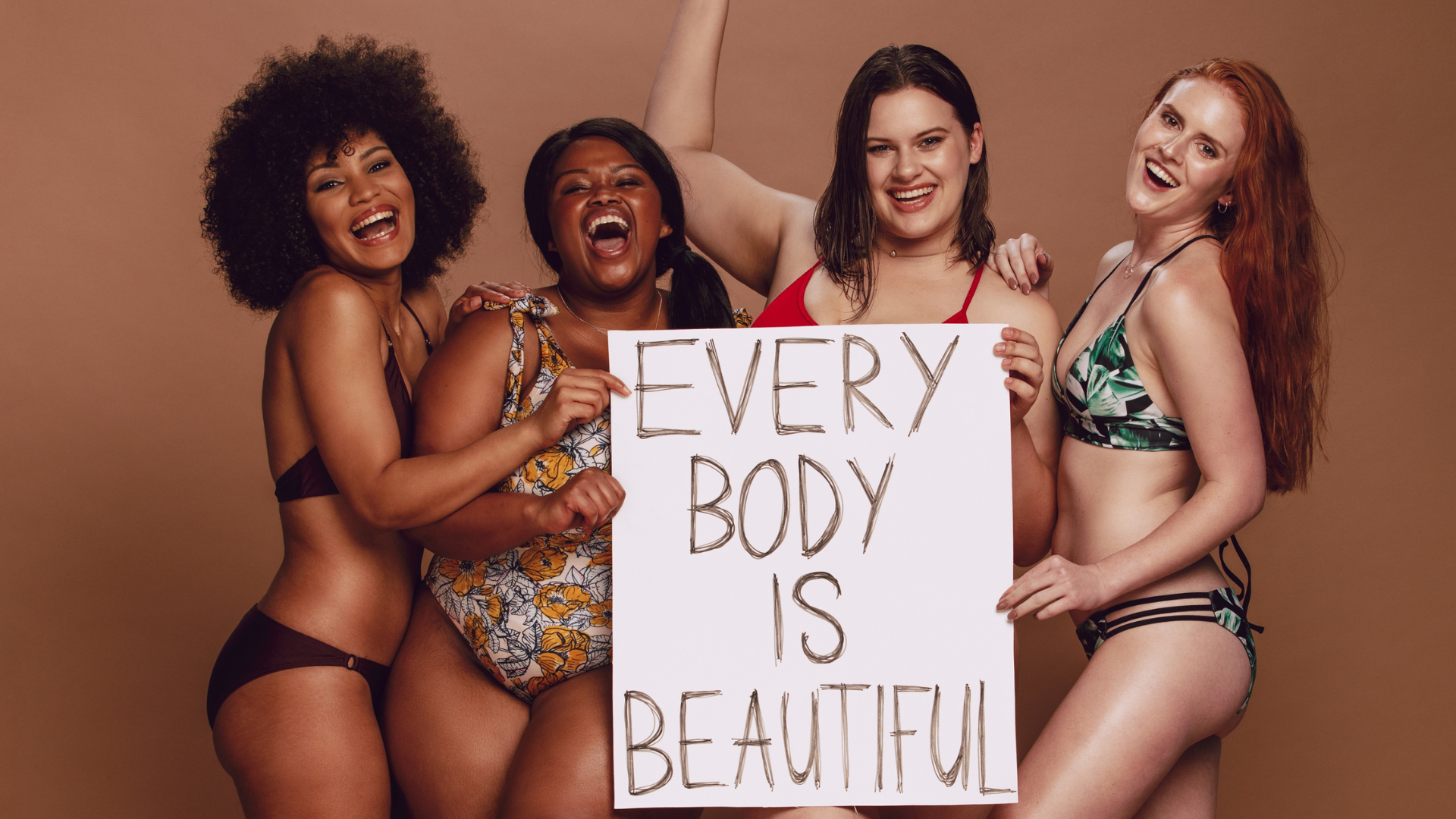How Diet Culture Is Wrecking Your Mental Health
Diet culture is hell bent on selling you on the fact that you are not good enough as you are. Ditching diet culture and trying Intuitive Eating can help.
Diet culture is wrecking your mental health. Trust me, I’m an intuitive eating and somatic therapist, I should know. Even if you think you haven’t been impacted by it, you have been. We are but fish in diet culture’s ocean. I want to help you swim out. (Okay, maybe this metaphor is getting out of hand.)
As a somatic therapist, I want to explore just how diet culture is impacting you in ways that you might not even be aware of. So, if you’re ready to ditch diet culture and making your body yours again, read on.
What is Diet Culture?
Diet culture promotes chronic stress, anxiety, and low self-worth while ignoring the truth that health looks different for everyone.
Diet culture is a system of beliefs that equates thinness with health, morality, and personal value. It teaches that smaller bodies are better bodies and that food should be earned, restricted, or controlled. These messages, often reinforced through social media, wellness trends, and even healthcare, create deep shame and disconnection from the body’s natural cues. Diet culture promotes chronic stress, anxiety, and low self-worth while ignoring the truth that health looks different for everyone. Understanding what diet culture is helps you begin to see how it quietly shapes your relationship with food, your body, and your mental health.
Diet Culture Makes You Focus on What You Can’t Control
The Myth of Set Point Weight and Metabolism
There is a lot of debate over what a person’s set point weight is still ongoing, but there is data to suggest that a person’s body will try to maintain a level of homeostasis, making weight loss challenging. Especially if we are talking about rapid weight loss due to overly restricting caloric intake.
Lindo Bacon who wrote the book “Body Respect” says:
“Many factors other than your size, fat, and muscle tissue figure in resting metabolism. Some are genetic and immutable. You may have been born with the ability to burn a lot of energy quickly and effortlessly, while others have what’s called a “sluggish metabolism”and don’t use energy at a very fast rate. It’s interesting to consider the cultural value judgment in using the term “sluggish”; from a scientific perspective, the person with a slower metabolism is much more efficient, a trait that would have been highly prized in earlier times when food was harder to come by.”
Why Weight Isn’t the Full Story of Health
This is to say that by looking at body weight alone we are more than likely looking at one point of data about a person’s physiology that doesn’t tell the whole story. We don’t know why people weigh what they do. This is because weight has to do with a complicated, interconnected set of factors that require a lot of investigation. Weight can be a symptom of something going on, not the cause.
*Important note: Lindo Bacon and the Health at Every Size movement has come under some controversy due to the emphasis on health and the assumption that people can always control their health. I am not sure that even Lindo is on board with this but wanted to note that I do acknowledge and honor this stance. People do not owe us health. I also believe that people with all different health statuses, religions, creeds, body size, sexual orientations, gender identities, and colors should be involved in these conversations.
By looking at body weight alone we are more than likely looking at one point of data about a person’s physiology that doesn’t tell the whole story.
The Emotional and Psychological Cost of Diet Culture
Diet Culture as a Driver of Shame
I don’t think it takes a lot of investigation or convincing that diet culture is hell bent on selling you on the fact that you are not good enough as you are.
One thing I find myself asking my clients over and over again is this: “If you woke up tomorrow at your ‘goal weight,’ what about your life would change?” Now, sometimes people do say that their joint pain would go away or their blood work might come back different, and I understand that. However, a lot of people say things like:
“I would be able to walk into a room without thinking about what others are thinking of my body.”
“I would have the confidence to talk to my boss about a promotion.”
“The guy I have wanted to ask me out for forever might actually look at me.”
“People would look at me and not through me.”
The Difference In How People With Larger Bodies Are Treated
Aubrey Gordon, cohost of the podcast “Maintenance Phase” and author of “What We Don’t Talk About When We Talk About Fat,” says:
“We need a world that insists upon safety and dignity for all of us—not because we are beautiful, healthy, blameless, exceptional, or beyond reproach, but because we are human beings.”
I quote this to say that there is a stark difference in the way that people in larger bodies are treated. This absolutely has to be a part of the conversation when we talk about the shame people face due to diet culture. People shame others and they feel shame because they fear fat. Being able to work on deconstructing the shame in your own head helps to dial down the intense sense of shame felt. This isn’t to say that larger cultural and policy change still needs to happen.
How Diet Culture Disconnects You from Your Body
Why Somatic Therapy Offers a Different Path
One reason I’m drawn to Somatic Experiencing as a therapeutic modality is because it is a bottom-up approach to mental health. Instead of guiding clients to cognitively challenge thoughts and behaviors, I help them to track sensation and emotion in order to resolve chronic stress and heal from trauma.
Diet culture is a top-down approach to “caring” for your body. It insists on ignoring the body’s hunger, fullness, and satiety cues in order to pursue thinness. Over time, if these basic needs keep getting overridden, then tapping into your body’s natural cues can become more difficult or be laden with shame and moral judgement.
How Intuitive Eating Restores Body Trust
This is why I became an Intuitive Eating counselor. Intuitive Eating helps clients to ditch diet culture, challenge the inner food critic, and have an all-foods-fit model. By having mental flexibility with food, you can cultivate body trust. You trust it to tell you what it needs, and it trusts you to give it. Hey, even Taylor Swift reports being an Intuitive Eater – it works!
Diet Culture is a Thief of Joy And Presence.
When we are trying so hard to override natural impulses and needs, it requires a ton of headspace. If we are constantly aware of how others are looking at us because of our body image insecurity, we are not present. When we are obsessed with becoming thin, we give a lot of our mental energy over to that pursuit.
Signs You’re Caught in the Diet Culture Cycle
Here are some signs that you might be losing part of yourself to diet culture’s grip:
You are unable to attend events because of your strict food restrictions
You avoid being social because you’re critical of how you look
You keep putting off vacations because you want to be at your goal weight
You self-flagellate whenever you “go off track” with your diet
You are constantly researching the best new diet to lose weight fast
You obsess over other people’s bodies
This is what diet culture takes from us. Instead of being present and enjoying time with your kids at the pool, you are covering up. Being at war with your body, frankly, is a waste of time when we have this one precious life.
Practices That Help You Reconnect to Yourself
If you’re wanting to cultivate more presence in your life while working on rejecting diet culture, try some of the following:
Healing from Diet Culture Through Intuitive Eating and Somatic Therapy
Through trauma-informed therapy like Intuitive Eating and Somatic Therapy, you learn to recognize hunger, fullness, and emotional cues without judgment. This reduces anxiety, shame, and body distrust, replacing them with self-compassion and confidence. By healing the mind-body connection, therapy empowers you to build a peaceful relationship with food, your body, and yourself.
Ditch Diet Culture With Intuitive Eating
At Embodied Healing KC, our trauma-informed therapists guide you with compassion and skill, helping you safely process emotions and build resilience. If you’re fed up with diet culture like we are and would like some support, reach out! Lauren Bradley has immediate openings and is ready to help you on your journey.
Happy healing!
Frequently Asked Questions About Diet Culture and Intuitive Eating
-
Diet culture is a belief system that values thinness and appearance over health and wellbeing. It increases anxiety, shame, and disconnection from body trust, often leading to disordered eating and poor mental health.
-
Diet culture teaches that your worth is tied to body size. This creates shame, guilt, and feelings of failure when weight loss goals aren’t met, damaging both confidence and self-compassion.
-
Yes. Somatic therapy helps you reconnect to body sensations, regulate the nervous system, and release shame stored in the body. It supports healing from diet culture by restoring safety and trust within yourself.
-
Intuitive eating encourages you to listen to your body’s hunger and fullness cues instead of following restrictive diet rules. It builds body trust, reduces guilt around food, and promotes emotional balance.
-
For trauma survivors, diet culture can reinforce control-based coping mechanisms and body disconnection. Trauma-informed therapy helps clients rebuild a safe, compassionate relationship with their bodies.
-
Healing starts with awareness and self-compassion. Somatic therapy, intuitive eating, mindfulness, and trauma-informed counseling can help you reject diet culture and find peace with your body and food.
Stevie Olson-Spiegel is a Licensed Therapist and Somatic Experiencing Practitioner located in Kansas City. She uses Somatic Experiencing as her main body-based trauma healing modality, as well as EMDR. As an Intuitive Eating Counselor, she uses these principles to help her clients challenge their relationship with their cultural misconceptions about their body and food.








